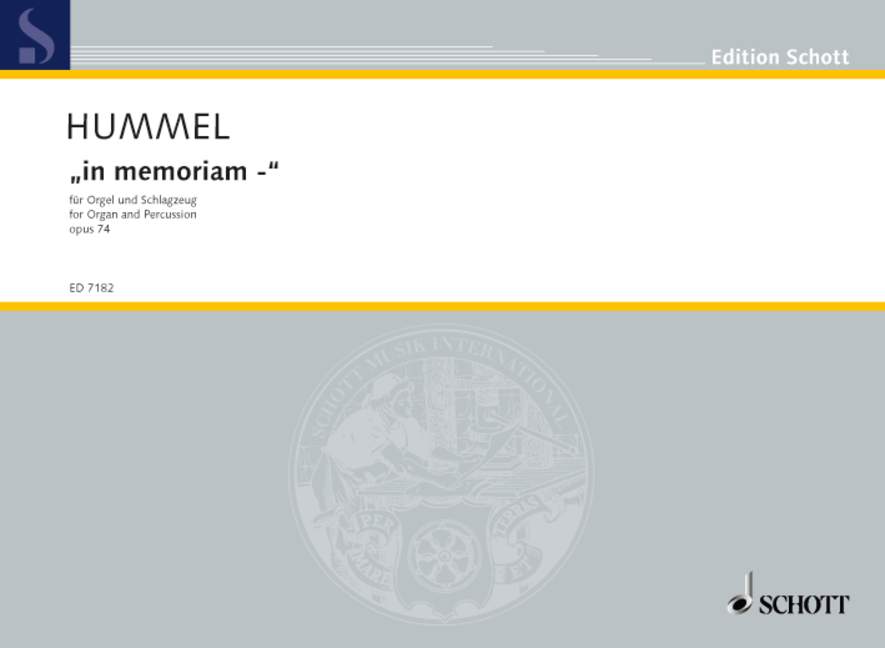"in memoriam ..." for Organ and Percussion, op. 74 (1980)

I.
Invocation
II.
Toccata ![]() beginning
beginning
III. Requiem
First Performance: October 17, 1982, Frankfurt, Peterskirche
Bernd Kremling / Matthias Balzer

Percussion: Vibraphone, 2 bongos, 2 congas, small drum, claves, temple-block, wood-block drum, tam-tam, gong, 4 cymbals, sizzle cymbal.
Dedication: Dedicated to the memory of my friend Dietrich von Bausznern
Duration: 14 Minutes
Publisher: Schott Music ED 7182 / ISMN: 979-0-001-07529-9 edition zeitklang
edition zeitklang
Op.74
was written in 1980 and is dedicated to the memory of my friend Dietrich von Bausznern,
who died in January of the same year as the result of a vicious illness.
In the short movements, Invocation - Toccata - Requiem,
the letters corresponding to note-names in the name Dietrich von Bausznern, D
- E - C - H (English B) - B (English B-flat)- A- Es (English E-flat) - E,
are treated in a variety of ways.
The Invocation with its urgent
gestures contrasts with the Toccata's flowing regularity, which
gives the metal and membrane instruments an opportunity for virtuosity.
At
the centre of the concluding Requiem, all the motif material of
the work is brought together in an arioso manner. Following an acoustic climax,
a reprise leads into a quotation of the chorale melody "Wenn wir in höchsten
Nöten sein" ("When we are in deepest need"). In extreme
pp, the work dies away.
Bertold Hummel
Chorale:
Wenn
wir in höchsten Nöten sein
und wissen nicht, wo aus noch ein,
und finden weder Hilf´ noch Rat
ob wir gleich sorgen früh bis spat,
So ist dies unser Trost
allein,
dass wir zusammen insgeheim
dich anrufen, o treuer Gott,
um
Rettung aus der Angst und Not.
Translation:
(When
we are in deepest need,
and no longer know in from out,
and find neither
help nor counsel,
although we worry from morning till night,
our
one consolation is this alone,
that we can all in our hearts
call to
you, oh faithful God,
for rescue from fear and need.)
Text:
Paul Eber (1511-1569)
Melody: Lyon 1547
Press
Nord-West-Zeitung,
Oldenburg, 12th June, 1987
...
a deeply impressive composition combining on equal terms a large selection of
percussion instruments with the organ. Musical effects of startling intensity
created a canvas of deep sadness and mental despair. Hummel succeeded in this
work with the movements Invocation, Toccata and Requiem in
conjuring up a profusion of magically fascinating musical visions. The chorale
"Wenn wir in höchsten Nöten sein" is heard at the end
alone as a cantus firmus, accompanied "forsakenly" by an unsettlingly
pale bass. Daubs of vibraphone colour brought light. Claus Hecker on the organ
and Axel Fries on percussion offered a successful interpretation, touching and
disturbing.
Rhein-Neckar-Zeitung,
3rd March, 1994
The
unreal hovering of seventh and tritone sounds on the vibraphone, the long trills
and whirring runs on the organ, everything is in choice, meditative colours. This
takes on dynamic life and almost explodes in the driving regularity of the Toccata
with pulsating rhythms on cymbals, wood-blocks and tom-toms, finally finding rest
in a Chorale, slipping quietly into vagueness and openness.
Schwäbische
Post, 23rd April, 1986
...
a work that stirs up feelings, even if - or precisely when - one does not know
that Hummel took the musical material from the musically usable letters of the
name von Bausznern and in the third movement - Requiem - quotes a chorale. In
an "Invocation" of mounting tension, a superb "Toccata"
(it was almost incredible that one percussionist alone could produce this rapid
changing of the most varied tone colours) and a meditative "Requiem",
both performers demonstrated the highest levels of musical partnership.
Main-Post,
9th June, 1986
Bertold
Hummel's op. 74, "in memoriam", whose four sections on organ
and marimbaphone revealed a multiplicity of highly sensitive musical thoughts,
left a no less deep impression. Passages of pure mystical immersion provided intense
contrast to the waves of emotion.
Darmstädter
Echo, 24th March, 1987
Three economic movements without padding - the sometimes highly dramatic developments animated the soloists to gripping releases of energy. In the unfolding of copious musical gestures as also in the filigree details, organ and percussion parts are closely intermeshed.